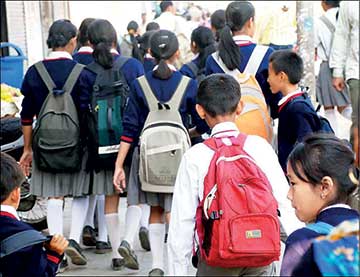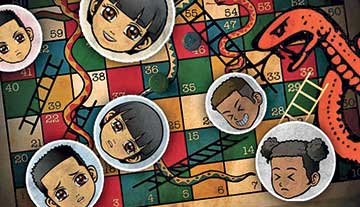G. Gautama
My dear educator friends….
One more year is closing soon, nine months have gone by. One school year has begun four months ago. Indian schools are undergoing shifts in the system beneath the surface. The ground is shaking and shifting. The settings are being refreshed, to use the language of computers, hand held devices and cell phones. There is news of upcoming amendments to the National Education Policy. Consultations are almost concluded and a debate is on about the likely changes.
 Some things do not change…. as a teacher, you and I see children at least 200 days a year, taking away the holidays and vacation days. While all our time is not spent in classes, we do spend at least four hours, and sometimes six, in the company of children. There are subjects, games, tests, supervision as part of our stated responsibilities.
Some things do not change…. as a teacher, you and I see children at least 200 days a year, taking away the holidays and vacation days. While all our time is not spent in classes, we do spend at least four hours, and sometimes six, in the company of children. There are subjects, games, tests, supervision as part of our stated responsibilities.
But more than subjects, young ones are our responsibility. I am sure you would have taken care of them and nourished their spirits however difficult it may have been. I am sure you would have spoken to each student at least a few times about the rainbow, or the frog, or his health, or the little limp you noticed. You must have spoken to the child about the grandmother’s passing away or the crowded bus in which she travels. Of course your children would feel happy because with each passing day they feel they matter and that you care enough to notice them and speak to them.
The system is getting ready for another convulsion and high decibel proclamation of the new policy. I don’t know how you receive the news that the government now wants to allow schools to fail children in class 5. Right now the rules say that no child can be held back till class 8. Are you happy or sad? Glad or alarmed? Do you feel children will be helped by this change of policy? Do you think this will make your job easier? If a child does not attend and is dreamy in your class, what will you do? Will you tell the child, “Please attend or you will fail!”
And will the child, though you never use the stick to hit or the hand to slap, feel a bit scared when he or she sees you, as you hold the power to fail? With this invisible stick, will you be more powerful? What do you think you will lose? Whom will this be good for and for whom will it be bad? Will the bright child in your class be affected? Or will it be the child who has less support at home and more burden than his young shoulders can carry… a dysfunctional home, punishment, rough environment? The system is getting ready to make this child feel even worse because he or she is not coping with math adequately or is unable to muster the required spelling and grammar?
A teacher teaches children and each child is special… as special as it is to the parents when born. The teacher nourishes the spirit of each child with words and gestures. The caring belief in the possibilities and hidden capacities is what makes a child step out of the regressive self-defeating messages that children sometimes internalize. We don’t know where children gather these messages. But the teacher is the fount where such spirits drink and go away assuaged, refreshed and with some hope in their heart. The teacher’s job is difficult.
 But this job just got more difficult. You have been given the power to fail little ones. And the managements will be happy as the results in the senior classes will be better, the poor performers having been weeded out earlier. How will you tell the child to carry hope and yet fail the child? You will need to ask, who you work for, and what you work for? Will you be happier as a teacher if your school declares 100% first class or would you be happier if there were people who passed, who did reasonably well and some who did very well? Which would you call a humane school?
But this job just got more difficult. You have been given the power to fail little ones. And the managements will be happy as the results in the senior classes will be better, the poor performers having been weeded out earlier. How will you tell the child to carry hope and yet fail the child? You will need to ask, who you work for, and what you work for? Will you be happier as a teacher if your school declares 100% first class or would you be happier if there were people who passed, who did reasonably well and some who did very well? Which would you call a humane school?
And if you really want to stay free of conflict, you will need to work harder and learn. Of course this is the age of the lifelong learner. But the going has got tougher – how will you teach so that each child shines? What will you do so no child feels punished, shamed, and separated from classmates, because that is what failing means?
Of course you teach subjects, but will you teach hope and possibility or fear and punishment? Will the children still come and speak to you with smiles, or watch you from the distance, wondering when the hidden stick will show itself?
Few of us can say we have not failed children, and the children have not failed us. I hope that there will be more teachers who can say this.
The author served at The School KFI as Principal from 1991-2009 and Director from 2006-2012. He has been involved with Pathashaala from its conception and now serves as Director of the newest KFI school. As an educator he is happy that he has not failed any child and no child has failed him. He can be reached at gautama2006@gmail.com.
